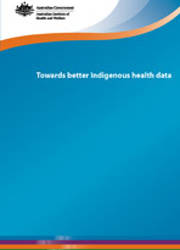Towards better Indigenous health data
Citation
AIHW
Australian Institute of Health and Welfare (2013) Towards better Indigenous health data, AIHW, Australian Government, accessed 19 April 2024.
APA
Australian Institute of Health and Welfare. (2013). Towards better Indigenous health data. Canberra: AIHW.
MLA
Australian Institute of Health and Welfare. Towards better Indigenous health data. AIHW, 2013.
Vancouver
Australian Institute of Health and Welfare. Towards better Indigenous health data. Canberra: AIHW; 2013.
Harvard
Australian Institute of Health and Welfare 2013, Towards better Indigenous health data, AIHW, Canberra.
PDF | 1.3Mb
This report describes Phase 1 of the support and evaluation project of the AIHW's National best practice guidelines for collecting Indigenous status in health data sets (the Guidelines). It found that the processes for, and status of, Guidelines implementation varied across data sets and health sectors in scope for this project. The report identifies barriers to and facilitators for implementation across the various health sectors, and recommends how implementation processes could be improved.
- ISBN: 978-1-74249-434-0
- Cat. no: IHW 93
- Pages: 88
-
The processes for, and status of, Guidelines implementation varied across data sets and health sectors
-
Indigenous status data are generally of high quality in the hospitals sector data collections
-
The general practice sector and pathology data require more work to improve identification Cancer registries



